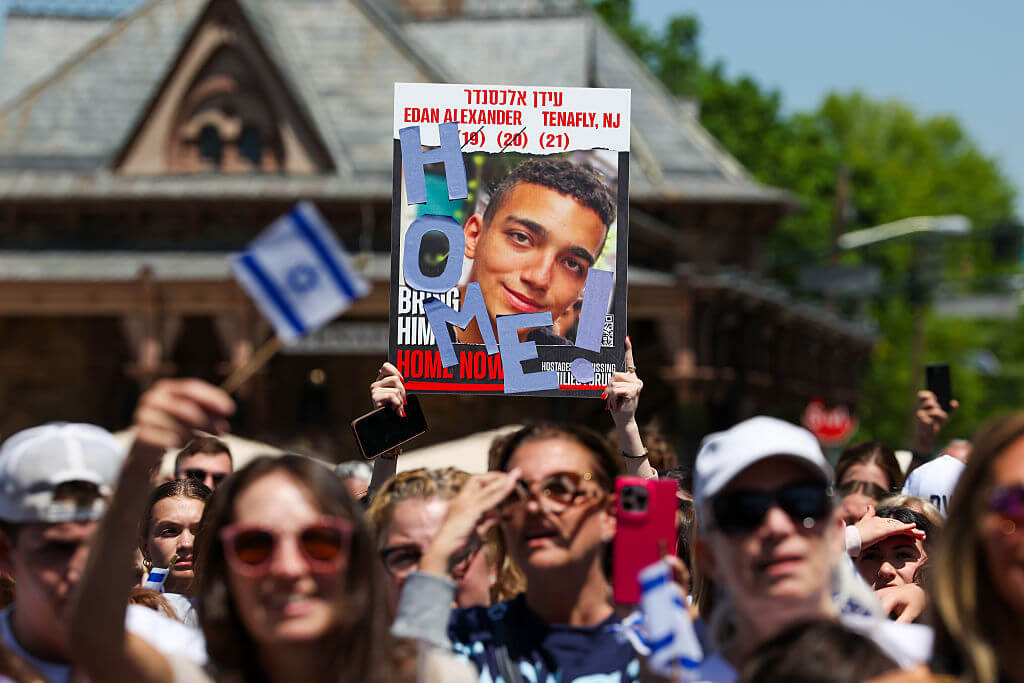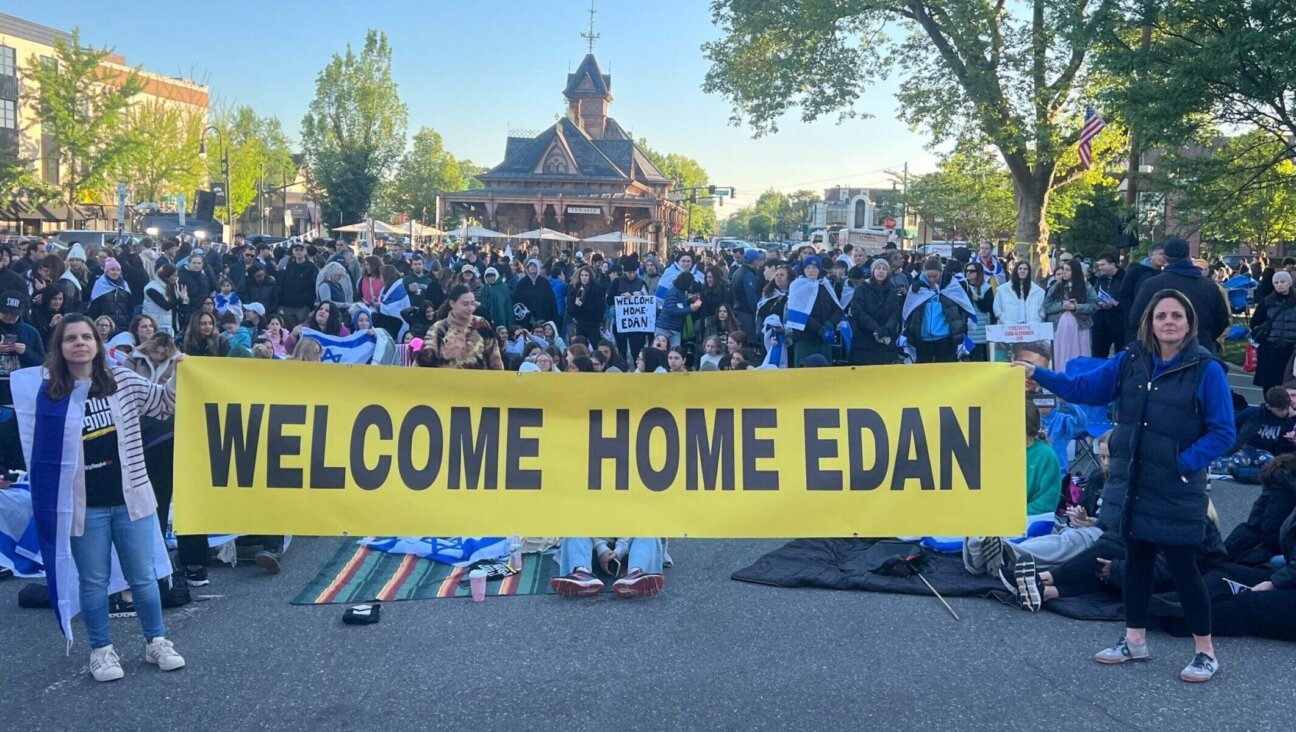His Jewish wedding at a Nazi enclave was a ‘middle finger extended to Hitler.’ So was the rest of his life.

Mark and Felice Feldstein with their family, on their wedding day in 1955 and later in life. (Courtesy Mark Feldstein; collage by Mollie Suss)
(JTA) — Felice Jacobs and Alan Feldstein could have tied the knot in Phoenix, where they met and where his mother worked at the local Reform synagogue. Or they could have held their wedding on the Austrian Army base where Alan was stationed at the time.
Instead, they chose the Eagle’s Nest, the Nazis’ former mountain retreat in the Bavarian Alps — a location that, as far as anyone knew, had never before hosted a Jewish wedding.
“We got married there because my husband wanted to thumb his nose at Hitler,” Felice Feldstein recalled last week.
Taking place just 10 years after Hitler’s defeat and death, the Feldsteins’ August 1955 nuptials were so notable that the Jewish Telegraphic Agency covered them at the time, identifying the event as “the first Orthodox Jewish wedding celebrated in the town of Berchtesgaden, Hitler’s mountain retreat and to this day a hotbed of Nazism.”
It was not the last time that Alan Feldstein, who died last month at 88, would take a stand.
As a new faculty member at the University of Virginia in 1968, Feldstein once arrived home with only half a haircut — the result of an impromptu, one-man walkout after he learned that the barber shop wouldn’t serve Black customers.
After working at Los Alamos National Laboratory after returning from Europe, Feldstein earned a PhD in math from the University of California, Los Angeles. He then embarked on an academic career, first teaching at Brown University in Providence, Rhode Island. When a colleague decamped for Charlottesville, Feldstein set about convincing his wife to head south, too.
Felice was skeptical. Tension over race relations in the South was high: Charlottesville had only recently desegregated its schools after an extended fight; Martin Luther King, Jr. was assassinated the spring before their move. Alan soothed her anxiety by showing her a newspaper from his visit featuring a centerfold declaration in support of racial integration, signed by hundreds of local residents.
“That was enough for me to say, ‘we’re moving to a liberal town. We’ll be OK,’” she recalled.
The revelation about the barber shop came as a shock. But Feldstein did more than walk out. He went to the dean, who he knew also got his hair cut there, to press him to join a boycott.
The petition was not well received. “That’s the trouble with you outsiders coming in here and telling us what to do,” the dean told Alan, according to notes he took at the time.
For Alan, “outsiders” clearly meant Jews — which only served to galvanize him further. Ultimately, a boycott of segregated barbers supported by the University of Virginia’s student government caused many of the shops to agree to serve Black customers.
The victory would be an enduring point of pride for the Feldsteins — but in some ways it was short-lived. Alan’s contract was not renewed, which their son Mark said everyone understood to be retaliation. The family left Charlottesville, and Alan returned to his alma mater, Arizona State University, where he taught for the rest of his career.
Mark Feldstein said his father’s activism inspired his own: In junior high, he conducted an expose on the racist textbooks being used in the classroom. It also jump-started his own career in journalism. Mark is now the chair of broadcast journalism at the University of Maryland, after an extensive career in investigative reporting.
For the family, the wedding at the Eagle’s Nest was a foundational story. “Their getting married at Berchtesgaden in the aftermath of World War II was legendary,” Mark said. “And we were all very proud of that.”
American troops were occupying Berchtesgaden at the time, but the vast underground bunkers built for the Nazis had already been turned into a tourist destination.
Felice didn’t take the tours. She was focused on the brass tacks of executing a marriage in another country, which included a civil wedding in nearby Salzburg in addition to the religious ceremony at the Alpine Inn, which sat atop a tunnel in which the Nazi leader Hermann Goering’s collection of looted art was found after the war.
At the Alpine Inn, the couple were married under a chuppah, the traditional Jewish wedding canopy. The rabbi was Oscar Lifschutz, a U.S. Army colonel whose long and storied military career included escorting the remains of Zionist leader Theodor Herzl from his grave in Vienna to a new burial site in Israel in 1949.
Afterwards, Felice recalled, the couple dined in a “lovely, lovely room” and stayed the night — running up a total bill of $125, or about $1,300 today. About 10 of Alan’s Army friends were present for the wedding, along with his mother.
“This wasn’t that long after World War II ended, and I think he and my mom both felt like this was not just a middle finger extended to Hitler but also a kind of affirmation of Jewish survival in the face of the attempt to extinguish our people,” Mark Feldstein said.
Among the ghastly toll were members of the Feldsteins’ extended families. Alan was with his grandfather when word arrived about the murder of someone in their family; Mark said he learned that their family came from a shtetl that was just across a river from a concentration camp. “No Jews made it through, including our family,” he said.
Felice recalled, “My grandmother’s sister, and her husband and family were annihilated. I have a family picture of that family. They were, I guess, wealthy Jews and they moved to Berlin. And that was the end of them.”
Over the following decade, the couple would engage in another act of defiance: producing four Jewish children. After Mark came three girls — Rachel, Suzie and Sarah.
According to family lore, Mark Feldstein recalled, his father’s mother was critical when the couple announced their third pregnancy. She asked why they were having so many children.
“Well, Hitler murdered 6 million,” his father responded. “She shot back, ‘You don’t have to make up for all of them, do you?’”
Felice said her four children made sure that she and her husband of 66 years were never alone in the final months of his life.
“I am the luckiest person in the world,” she said.
Ill health in the last years of his life meant that Alan Feldstein didn’t speak to his family in detail about the deadly 2017 white-supremacist march in Charlottesville that saw neo-Nazis marching past the Reform synagogue where Mark Feldstein studied for his bar mitzvah.
Nor did he talk to them about Madison Cawthorn, the North Carolina Republican congressional candidate whose 2017 trip to the Eagle’s Nest propelled the Feldsteins’ wedding site back into public view in August 2020.
But his family knew that he was distressed by the hard-right turn that the United States appeared to be taking when Donald Trump was elected president in 2016.
“He saw parallels with what happened in Germany in the 1930s,” Mark Feldstein said. “The rise of authoritarianism, the promotion of racism — he was troubled by it, really troubled by it.”
Alan Feldstein died Jan. 29 and was buried in a private service on Jan. 31. The family urged mourners to direct donations to their synagogue in Arizona, Temple Emanuel of Tempe. Then, last week, the temple sent an email to community members: Someone had vandalized synagogue property, including by drawing swastikas on its trash cans.
“Does it almost feel like you came full circle from Berchtesgaden there to what’s happening here?” Mark Feldstein asked his mother.
“Well, that’s an angle,” Felice Feldstein said. “Of course [Alan] didn’t know what happened last week at the temple, but I can imagine how upsetting this would have been to him.”
—
The post His Jewish wedding at a Nazi enclave was a ‘middle finger extended to Hitler.’ So was the rest of his life. appeared first on Jewish Telegraphic Agency.
The Forward is free to read, but it isn’t free to produce

I hope you appreciated this article. Before you go, I’d like to ask you to please support the Forward.
Now more than ever, American Jews need independent news they can trust, with reporting driven by truth, not ideology. We serve you, not any ideological agenda.
At a time when other newsrooms are closing or cutting back, the Forward has removed its paywall and invested additional resources to report on the ground from Israel and around the U.S. on the impact of the war, rising antisemitism and polarized discourse.
This is a great time to support independent Jewish journalism you rely on. Make a gift today!
— Rachel Fishman Feddersen, Publisher and CEO
Support our mission to tell the Jewish story fully and fairly.
Most Popular
- 1

Fast Forward Ye debuts ‘Heil Hitler’ music video that includes a sample of a Hitler speech
- 2

Opinion It looks like Israel totally underestimated Trump
- 3

Culture Is Pope Leo Jewish? Ask his distant cousins — like me
- 4

Fast Forward Student suspended for ‘F— the Jews’ video defends himself on antisemitic podcast
In Case You Missed It
-

News In Edan Alexander’s hometown in New Jersey, months of fear and anguish give way to joy and relief
-

Fast Forward What’s next for suspended student who posted ‘F— the Jews’ video? An alt-right media tour
-

Opinion Despite Netanyahu, Edan Alexander is finally free
-

Opinion A judge just released another pro-Palestinian activist. Here’s why that’s good for the Jews
-
Shop the Forward Store
100% of profits support our journalism
Republish This Story
Please read before republishing
We’re happy to make this story available to republish for free, unless it originated with JTA, Haaretz or another publication (as indicated on the article) and as long as you follow our guidelines.
You must comply with the following:
- Credit the Forward
- Retain our pixel
- Preserve our canonical link in Google search
- Add a noindex tag in Google search
See our full guidelines for more information, and this guide for detail about canonical URLs.
To republish, copy the HTML by clicking on the yellow button to the right; it includes our tracking pixel, all paragraph styles and hyperlinks, the author byline and credit to the Forward. It does not include images; to avoid copyright violations, you must add them manually, following our guidelines. Please email us at [email protected], subject line “republish,” with any questions or to let us know what stories you’re picking up.














